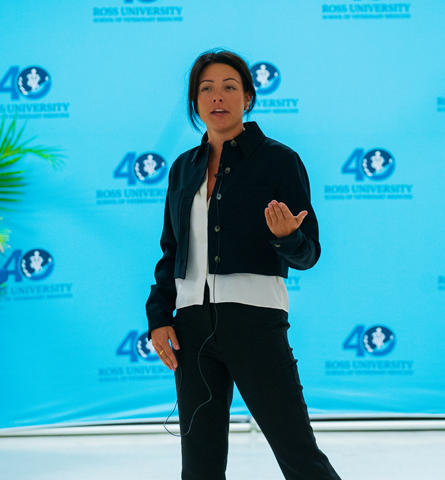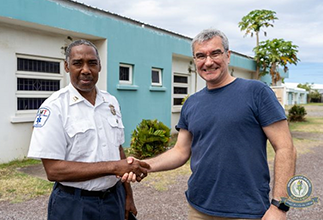Kiana Jackson
Both coming to Ross University School of Veterinary Medicine (Ross Vet) from Cornell University’s animal science program, Kiana Jackson, Class of ’25, and Chrishell Marble, Class of ’24, had a lot in common in as native News Yorkers pursuing their dreams of becoming veterinarians. Through a Cornell student organization Marble founded – Minority Animal Science Students – the two were first introduced as undergraduates seeking networking and mentorship opportunities with their peers from underrepresented groups.
Today, the pair are reunited through leadership positions with Ross Vet’s chapter of the Student National Association for Black Veterinarians (SNABV), seeking to accomplish the same mission and more that first brought them together six years ago.
“SNABV has been a good outlet in helping me connect with different people from across the United States,” says Jackson, now serving as the current SNABV president. “Having the community aspect of a club and something to feel grounded while being so far away from home and experiencing a different culture in St. Kitts is important for all of us.”
Jackson took on the chapter’s top leadership role in January 2023 after serving as vice president in the year prior. In leading the way for the next year, she hopes to increase exposure of SNABV to all students, not just those who identify as Black or African American. Helping support that goal is Marble, SNABV’s membership and outreach coordinator.
“I am very proud of our opportunity to be a standing voice for diversity on campus,” says Marble. “It is important to look at everything we are doing as future veterinarians from an inclusive and diverse perspective, and that means branching out for new ideas and learning from different people and cultures. Correlating that into how we practice medicine and provide the best care for our patients will prepare us to be better veterinarians.”
ABOUT THE STUDENT NATIONAL ASSOCIATION FOR BLACK VETERINARIANS
Chrishell Marble
On June 23, 2020, a group of 25 students at Ross University School of Veterinary Medicine (Ross Vet) became the charter leaders and members of the SNABV, which has become a leading organization championing diversity, equity, and inclusion (DEI) for the entire study body.
At the national level of the organization, the National Association for Black Veterinarians’ mission is, through leadership and membership, to build a network of individuals and organizations that advocate for Black people in veterinary medicine at every level of the profession. At Ross Vet, the SNABV’s goal is, per their charter statement –
To provide and seek mentorship, professional development, career planning advice, create a network of support at all levels of undergraduate and postgraduate training, and be of service to both the Ross Vet and St. Kitts communities. SNABV is a safe space for Black students to speak openly and freely about their experiences in and out of the classroom and continue minimize racial disparities within veterinary medicine and healthcare.
Since its founding nearly three years ago, SNABV has been honored twice with Ross Vet’s Student American Veterinary Medical Association (SAVMA) Leadership and Excellence Award for Diversity and Inclusion. The chapter’s work to establish a community for underrepresented students has inspired others to seek out and create several other student organizations dedicated to advancing DEI within the Ross Vet community and outside the classroom. Today, there are six organizations on campus that promote DEI as part of their mission, thanks in some part to the foundation SNABV has laid as the first officially recognized student organization to champion DEI.
Throughout the rest of Jackson and Marble’s pre-clinical coursework, the duo and rest of their executive board will work together to continue SNABV’s legacy as a leader among the Ross Vet community.
“Veterinary medicine is a majority White field, so I think overall we want to bring awareness to the discrepancy in cultural identities of veterinarians,” said Marble. “At some point, it could be detrimental to our patients and clientele through language barriers or lack of cultural understanding. Veterinary medicine has a diversity issue, and SNABV is here to address it.”
In 2022, the U.S. Bureau of Labor Statistics reported just 2.2% of practicing veterinarians identify as Black or African American compared to 90% White. Much work remains to address the lack of representation for minorities, but leaders like Jackson, Marble, and their peers are among the many students dedicated to changing the conversation for themselves and future veterinarians.
“The world is evolving. Times are changing. We must start seeing a situation holistically from multiple perspectives before we can take proper action,” says Jackson.








